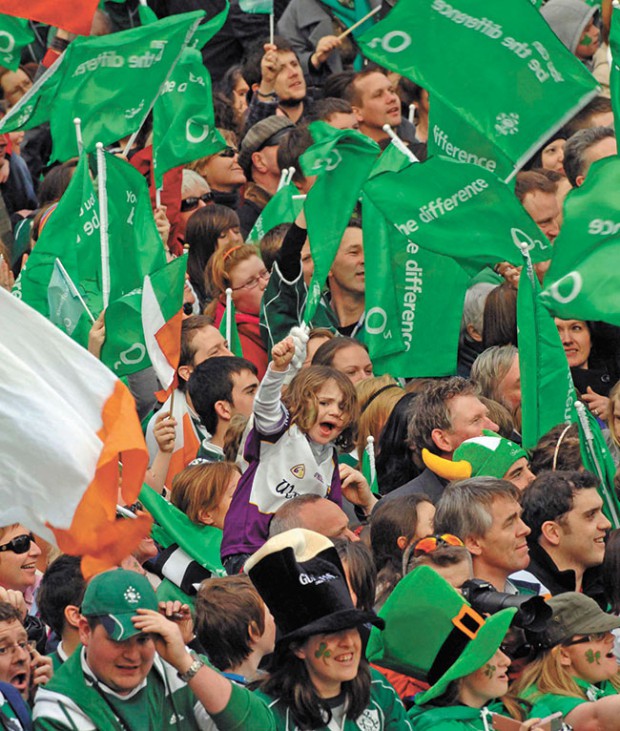2 November 2015 Edition
Conversations that need to be had – Hugo MacNeill
UNCOMFORTABLE CONVERSATIONS

• Ireland's rugby team has played a positive role in bringing people together
‘I learnt a lot from those conversations in the Irish rugby team. Hearing different personal stories. Challenging and discussing. Sometimes agreeing, sometimes not.Always with respect and trust’
THE IRISH RUGBY TEAM has always brought people together from all parts of the island when different forces were pushing them apart. Without threatening (or even discussing) anyones’s identity, nationality or sense of allegiance, this role continues to this day. Some of us felt that there was a further opportunity.
Absolute trust as teammates gave an opportunity to discuss any topic – even ‘The Troubles’. Our Ulster teammates came from the unionist tradition. I learned a lot by listening to their different stories and questioning, in return, in an atmosphere of mutual respect.
These would certainly not rank on the same scale of ‘uncomfortable’ as many of the stories in this series. We were a sports team. This was not life or death. The worst we did to each other was to have missed a tackle or not to have given a scoring pass. ‘The Troubles’ were very real for our Northern teammates. For most of us in the Republic, with a few exceptions, they were not threats to our daily lives.
I learnt a lot from those conversations. Hearing different personal stories. Challenging and discussing. Sometimes agreeing, sometimes not. Always with respect and trust.
It led me to get involved in organisations like the Ireland Funds and the British Irish Association.
The Ireland Funds was established in 1976 to help mobilise the practical support of the worldwide Irish family for those working for peace in Ireland. Though the mission of the Funds has broadened since, the focus on peace and reconciliation remains at the core.
The British Irish Association (BIA) was founded in 1973. Its principal event is an annual conference in Oxford or Cambridge designed to provide a safe space to meet for many who could not meet at home in Northern Ireland. It invited a broad range of Irish and British politicians, academics, combatants and others. I joined in 2004 and became Chair in 2013. In recent years we considered whether we needed to continue as people now have many other opportunities to meet and talk if they chose to do so. We got an overwhelming response to carry on from a very broad range of participants. They were able to have conversations that they could not have at home.
Conversations and dialogue have been at the heart of the work and mission of both the Ireland Funds and the BIA.
The feedback relating to the BIA also suggested a broadening of British and Irish topics. Major issues are on the horizon with implications for both islands.
The UK is seeing huge potential change. Scotland nearly left the Union. Will Britain leave the EU? If it does, will Scotland leave the UK? What about the wakening giant of English nationalism? Will only English MPs vote on English laws? Will there be a federal UK ? What will this mean for Wales and Northern Ireland? And so on and so on.
The most recent BIA conference involved politicians from England, Scotland, Wales and Northern Ireland with very different perspectives and no overall concensus or agreement
Take the question of Britain and Europe. What are the implications of Brexit on Northern Ireland?
The House of Commons Research Library published a report in 2013 on the question of Britain and Europe. It clearly concluded that, whereas there were some reforms required, the UK was a very significant beneficiary of EU membership. The conclusions in relation to Northern Ireland were even more emphatic.
Taking just a few points :
(a) Between 2007-2013, Northern Ireland received over €1.6billion in transfers from the EU. How would this be replaced?
(b) Restricting the ability to trade with the EU would have a greater negative impact on businesses than in any other area of the UK.
(c) The Good Friday Agreement has, as background, the assumption that both the UK and Ireland continue as members of the EU. If that were to change, what would be the impact across a number of fields and not only border controls?
Given the enormity of these consequences, what are people doing? Are the issues understood? How is the voice of Northern Ireland going to make itself heard? Given the potentially huge impact on the lives of so many, are these not also conversations that need to be had?
In addition, helping people to support the welfare of their families must provide a better environment to have the very painful and difficult conversations relating to the years of conflict.
Hugo Mac Neill is Chairperson of the British Irish Association Board Member of the Ireland Funds. Played rugby for Ireland 37 times between 1981 and 1988, including the first Rugby World Cup in 1987
Editor’s Note: Guest writers in the Uncomfortable Conversations series use their own terminology and do not always reflect the house style of An Phoblacht.




